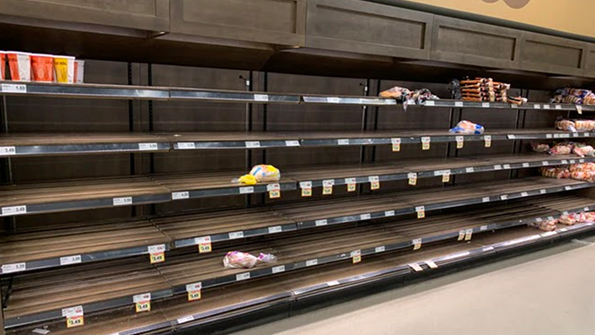
If you are in one of the countries applying restrictive measures in face of the COVID-19 virus, you are likely to have seen at least one of the following when buying for your food supplies: police asking you for the self-certificate you need when going to grocery shopping, bringing shopping to relatives, just returning from the shopping; supermarkets emptied out from toilet paper and dry pasta; a certain feeling of judgment when purchasing more than 5 tins of hearts palms (seriously, who buys those?!). Or worst, countries shutting down their borders, also to trade, increasing panic and anxiety.
But COVID-19 (or Coronavirus, if you feel like damaging a notorious brand for teenage alcoholic beverages) is a pandemic, and people are acting as if one like it. In the midst of hours-long queues at supermarkets and extraordinary purchases, governments keep telling that the food supply will never suffer and people should not massively stockpile for food, as food is there, and plenty. So, how worried should we be?
It is true, our food supply chains are so monitored and automatized that violent disruption is not likely to occur, unless physical disruption. It is true nonetheless, that there should be at least a couple of points where to keep an eye on:
- Foremost, vulnerable groups. Those people that cannot access supermarkets because of physical impairment, risk of contagion, or severe immune diseases. Throughout all the countries, several have been the examples of people volunteering for those, but systematic approach should be envisioned from governments;
- Then, employees on sick leave. Especially in these exceptional circumstances, everyone should be allowed of not going to work. But workers on the food chain should be properly replaced in order to not slow down the food supply excessively;
- Functioning of the e-commerce and online delivery. It is necessary to keep contactless, automatic, online, yet efficient food delivery running, in order to ease out the burden for traditional retailing systems;
- International food prices. Prices should be kept normal, not only because of economic and market reasons, but also to decrease the general feeling of panic that a violent change might cause in the population;
 There are many things to be done right now to prevent COVID-19 food crisis to happen.
There are many things to be done right now to prevent COVID-19 food crisis to happen.
But what would be an important lesson for our future? That more resilient agricultural systems are needed.
It is the interest of national and international authorities to provide each country the means to be better prepared against coronavirus, Ebola, avian flu, SARS, or any other fast-travelling disease that might tempt us to close our borders.
If history teaches us something, we’d better take notes now then.
Claudia Delicato, Tinada


